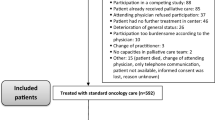Abstract
We aimed to evaluate the prevalences of self-reported anxiety and depression symptoms in hematological malignancy patients and to determine the association between the presence of these disorders and the results of the European Organization for Research and Treatment of Cancer Quality of Life Questionnaire-30 (EORTC QLQ-C30). One hundred and forty patients with a diagnosis of a hematological malignancy completed the Hospital Anxiety and Depression Scale (HADS) and the General Health Questionnaire. Patients with higher anxiety scores were more frequently inpatients, had higher EORTC general symptom scores, and they had lower cognitive, emotional, social functioning and global quality of life (QoL) scores (all p values <0.05). Patients with higher depression scores had more frequently active disease and were inpatients; they had higher mean Eastern Cooperative Oncology Group performance scores, EORTC gastrointestinal system and general symptom scores, and significantly lower physical, role, emotional, social and cognitive functioning and global QoL scores (all p values <0.01). During follow-up, it was observed that survival curves of patients with active disease who had higher HADS depression scores tended to be shorter than those with lower scores (p = 0.1). Anxiety and depression are frequent in hematological malignancy patients and associated with poor QoL and performance status. In addition, the presence of self-reported depression might have a predictive value for poor prognosis.

Similar content being viewed by others
References
Aaranson NK, Ahmedzai S, Bergman B, Bullinger M, Cull A, Duerz NJ, Filiberti A, Flechtner H, Fleishman SB, de Haes J, Kaasa S, Klee M, Osoba D, Razavi D, Rofe PB, Schraub S, Sneeuw K, Sullivan M, Takeda F (1993) The European Organization for Research and Treatment of Cancer QLQ-30: a quality-of-life instrument for use in international clinical trials in oncology. J Natl Cancer Inst 85:365–376
Andrykowski MA, Greiner CB, Altmaier EM, Burish TG, Antin JH, Gingrich R, McGarigle C, Henslee-Downey PJ (1995) Quality of life following bone marrow transplantation: findings from a multi-centre study. Br J Cancer 71:1322–1329
Aydemir O (1997) Validity and reliability of Turkish version of Hospital Anxiety and Depression scale. Turk J Psychiatry 8:280–287
Fayers PM, Aaranson NK, Bjordal K, Groenvold M, Curran D, Bottomley A (2001) on behalf of the EORTC Quality of Life Group The EORTC QLQ-C30 scoring manual (3rd edition). European Organisation for Research and Treatment of Cancer, Brussels
Gulbrandsen N, Hjermstad MJ, Wisloff F (2004) Interpretation of quality of life scores in multiple myeloma by comparison with a reference population and assessment of the clinical importance of score differences. for the Nordic Myeloma Study Group Eur J Haematol 72:172–180
Guzelant A, Goksel T, Ozkok S, Tasbakan S, Aysan T, Bottomley A (2004) The European Organization for Research and Treatment of Cancer QLQ-C30: an examination into the cultural validity and reliability of the Turkish version of the EORTC QLQ-C30. Eur J Cancer Care 13:135–144
Holzner B, Kemmler G, Kopp M, Nguyen-Van-Tam D, Sperner-Unterweger B, Greil R (2004) Quality of life of patients with chronic lymphocytic leukemia: results of a longitudinal investigation over 1 yr. Eur J Haematol 72:381–389
Kiecolt-Glaser J, Glaser R (2002) Depression and immune function: central pathways to morbidity and mortality. J Psychosom Res 53:873–876
Kiecolt-Glaser JK, McGuire L, Robles TF, Glaser R (2002) Psychoneuroimmunology: psychological influences on immune function and health. J Consult Clin Psychol 70:537–547
Kilic C (1996) General health questionnaire: a validity and reliability study. Turk J Psychiatry 7:3–9
Montgomery C, Pocock M, Titley K, Lloyd K (2003) Predicting psychological distress in patients with leukemia and lymphoma. J Psych Resn 54:289–292
Noyes RJ, Holt C, Massie M (1998) Anxiety disorders. In: Holland JC (ed) Psycho-oncology. Oxford University Press, New York, pp 548–563
Osoba D, Aaronson N, Zee B, Sprangers M, te Velde A (1997) Modification of the EORTC QLQ (version 2.0) based on content validity and reliability testing in large samples of patients with cancer. The Study Group on Quality of Life of the EORTC and the Symptom Control and Quality of Life Committees of the NCI of Canada Clinical Trials Group. Qual Life Res 6:103–108
Schleifer SJ, Keller SE, Bond RN, Cohen J, Stein M (1989) Major depressive disorder and immunity. Arch Gen Psychiatry 46:81–87
Schumacher A, Kessler T, Buchner T, Wewers D, van de Loo J (1998) Quality of life in adult patients with acute myeloid leukemia receiving intensive and prolonged chemotherapy—longitudinal study. Leukemia 12:586–592
Spiegel D (1996) Cancer and depression. Br J Psychiatry 168:109–116
Stark D, Kiely M, Smith A, Velikova G, House A, Selby P (2002) Anxiety disorders in cancer patients: their nature, associations, and relation to quality of life. J Clin Oncol 20:3137–3148
Taylor AE, Olver IN, Sivanthan T, Chi M, Purnell C (1999) Observer error in grading performance status in cancer patients. Support Care Cancer 7:332–335
Zigmond AS, Snaith PR (1983) The hospital anxiety and depression scale. Acta Psychiatr Scand 67:361–370
Zittoun R, Achard S, Rusziewski M (1999) Assessment of quality life during intensive chemotherapy or bone marrow transplantation. Psycho-Oncology 8:64–73
Zubrod CG, Schneiderman M, Frei E, Brindley C, Gold GL, Shnider B, Oviedo R, Gorman J, Jones R, Jonsson U, Colsky J, Chalmers T, Ferguson B, Dederick M, Holland J et al (1960) Cancer—appraisal of methods for the study of chemotherapy of cancer in man: comparative therapeutic trial of nitrogen mustard and triethylene thiophosphoramide. J Chron Dis 11:7–33
Author information
Authors and Affiliations
Corresponding author
Rights and permissions
About this article
Cite this article
Pamuk, G.E., Harmandar, F., Ermantaş, N. et al. EORTC QLQ-C30 assessment in Turkish patients with hematological malignancies. Ann Hematol 87, 305–310 (2008). https://doi.org/10.1007/s00277-008-0445-4
Received:
Accepted:
Published:
Issue Date:
DOI: https://doi.org/10.1007/s00277-008-0445-4




